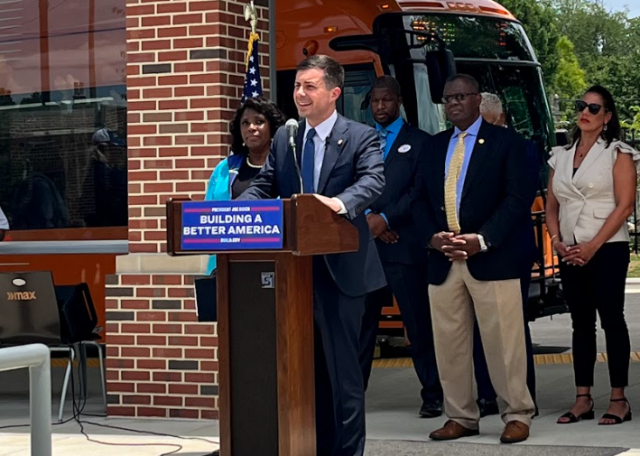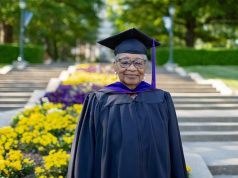
By Ryan Michaels
The Birmingham Times
Speaking in Birmingham on Thursday, U.S. Secretary of Transportation Pete Buttigieg announced a $1 billion plan aimed at reconnecting communities that were previously cut off from economic opportunities by transportation infrastructure.
“Transportation can connect us to jobs, services and loved ones, but we‘ve also seen countless cases around the country where a piece of infrastructure cuts off a neighborhood or a community because of how it was built,” said Buttigieg. “Using funds from President Biden’s Bipartisan Infrastructure Law, we are proud to announce the launch of Reconnecting Communities: the first-ever dedicated federal initiative to unify neighborhoods living with the impacts of past infrastructure choices that divided them.”
He described Reconnecting Communities as a broad “principle” of his department — not just a single program — to help remake infrastructure, with many efforts underway.
U.S. Rep. Terri Sewell (AL-07) said the Reconnecting Communities program will help right the wrongs of the past by connecting neighborhoods that were previously divided by highways and other infrastructure.
“This is about making sure that people can live where they want to live more affordably while accessing the jobs, schools, and services our city has to offer,” Sewell said.
Speaking outside the newly constructed Birmingham Xpress (BX) bus rapid transit system center in the Woodlawn community, that will soon connect residents from 25 communities to jobs, schools, and health care, Buttigieg said division within cities and towns by highways and other transportation infrastructure has been a longstanding problem in the United States.
“Think about what it means that we have the expression, ‘wrong side of the tracks.’ It means we have known this for a very long time,” Buttigieg.
Birmingham is “as fitting a place as you can find in the country to talk about the history and about the future of transportation equity in America,” Buttigieg said.
“The way I-65 [interstate] was constructed, for example, here in the middle of the [city], through the heart of Birmingham, displaced Black neighborhoods and created physical barriers and dead zones and still keep people apart,” Buttigieg said.
Examples of the sorts of projects that would be eligible for the program could include things like greenways, which are usually pedestrian and bike trails through cities, or projects like Birmingham Xpress.
“Whatever the specific shape the project takes, what they all have in common is that they empower communities to innovate and define their future. They provide people with better connections to jobs and opportunities and allow residents of places, that are today holding them back, to enjoy a safer, healthier, thriving experience in their neighborhood,” Buttigieg said.
Mayor Randall Woodfin pointed to City Walk Bham, a linear park being constructed under the new I-59/20 bridges downtown, as an example of how the city has worked to connect communities.
“This two-mile-long urban park that will open in the next few days will feature a variety of services that will be a connector for our entire community,” Woodfin said. “That positions City Walk as a bridge between opportunity and community,” he added.
Benard Simelton, president of the Alabama State Conference of the National Association for the Advancement of Colored People (NAACP), said the country’s latest investments in infrastructure will help correct mistakes of the past.
“Because of poor decisions that were made by [previous] transportation gurus, people have been cut off from progress, but because of the biggest investment in public transit and the largest bipartisan infrastructure bill in U.S. history, this will open the doors and opportunities for so many in the future,” Simelton said.
For more information about the Reconnecting Communities program, click here. Photos from Thursday’s events can be accessed here.




